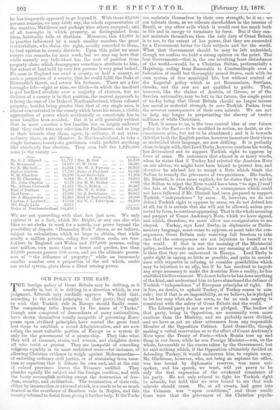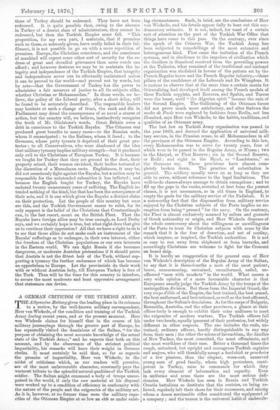OUR POLICY IN THE EAST.
THE. foreign policy of Great Britain may be drifting, as it usually is, but it is drifting in a direction which, in our judgment, Liberals may cordially approve. We hold that, according to the settled principles of that party,.they ought to wish that Turkish rule in Europe should finally cease. The conquering tribe known by the name of " Turks," though now composed of descendants of many nationalities, have shown themselves totally incapable of governing Euro- peans upon civilised principles, have wasted the great fund lent them to establish a sound Administration, and are now ruling the most valuable portion of Europe on a system fit only for the government of a pirate-ship. They take what they will of treasure, stores, and women, and slaughter down- all who resist or protest. They are incapable of conceding religious equality in its most restricted sense—for instance, of allowing Christian evidence to weigh against Mohammedan— of enforcing ordinary civil justice, or of abstaining from taxa- tion so rapacious that it defeats its own end, and at the cost of ruined provinces leaves the Treasury unfilled. They plunder equally the subject and the foreign creditor, and with the booty accomplish nothing except the destruction of free- dom, security, and civilisation. The termination of their rule, either by insurrection or external attack, is a result to be as much desired as the overthrow of Bourbon rule in Naples, and this country is bound to desist from giving it further help. If the Turks can maintain themselves by their own strength, be it so ; we can tolerate them, as we tolerate slaveholders in the interior of Brazil, or any other evils which it would cost too much both in life and in energy to terminate by force. But if they can- not maintain themselves, then the only duty of Great Britain is to see, to the extent of her power, that they are succeeded by a Government better for their subjects and for the world. What that Government should be may be left undecided, though we confess we hold a strong opinion on the point. The best Government—that is, the one involving least disturbance of the world—would be a Christian Sultan, preferentially a Hapsburg, ruling from Bessarabia to Constantinople over a federation of small but thoroughly armed States, each with its own system of free municipal life, but without control of the Imperial policy which as yet Roumanians, Servians, Greeks, and the rest are not qualified to guide. That, however, like the claims of Austria, of Greece, or of the Servian nationality, may be left to the future, the single point of to-day being that Great Britain should no longer misuse her moral or material strength to save Turkish Pashas from the severest consequences of their own misrule. We are not to help any longer in perpetuating the slavery of twelve millions of white Christians.
That, it seems to us, is the true central idea of our future policy in the East,—to be modified in action, no doubt, as cir- cumstances arise, but not to be abandoned ; and it is towards this that both the English parties, however immature their views or undecided their language, are now drifting. It is perfectly clear, to begin with, that Lord Derby, however cautious his words, has determined not to support Turkish right to oppress by force of arms. He announces that almost in so many words, when he states that if Turkey had rejected the Austrian Note on our advice, we might have been bound to protect her, and therefore he advised her to accept a Note which binds the Sultan to remedy the grievances of two provinces. His leader, Mr. Disraeli, is even more explicit, for he states that to advise the Sultan to reject the Note would have been "to sign [heal] the fate of the Turkish Empire," a consequence which could not have followed if Mr. Disraeli had been prepared to support Turkish " independence " by arms. If, however, we do not defend Turkish right to oppress by arms, we do not defend her at all, for it is certain that she will not be allowed, unless pro- tected by force, to continue oppressing. That is the whole meaning and purport of Count Andrassy's Note, which we have signed, and which, therefore, we must allow our co-signataries to see obeyed. Turkey, says Lord Derby, in diplomatic or Parlia- mentary language, must cease to oppress, or must take the con- sequences, Great Britain only reserving full freedom to take care that the consequences are not injurious to herself or to the world. If that is not the meaning of the Ministerial policy, neither words nor acts have any meaning at all, and it is thus that they are understood in Europe. Lord Derby is quite right in saying as little as possible, and quite in accord- ance with etiquette in refusing to consider possibilities which may be injurious to an ally, but if he has resolved to impede any steps necessary to make the Austrian Note a reality, he has stultified his Government. We do not believe he has done.anything of the kind, and understand him to have abandoned the defence of Turkish " independence " of European principles of right. He is free, no doubt, to uphold Turkey, if Turkey ceases to mis- rule ; but if that is an impossibility, as we believe, he is pledged to let her reap what she has sown, so far as such reaping is consistent with the safety of Great Britain and the world.
The Liberal party is not as yet so pledged. The leaders of that party, being in Opposition, are necessarily even more cautious than the Ministry, and are probably more divided, and we have as yet no clear utterances from any responsible Member of the Opposition Cabinet. Lord Granville, though making a verbal reservation as to the effect of Count Andrassy's Note upon the Treaty of Paris—which Russia tore up and flung in our faces, while he was Foreign Minister—was, on the whole, favourable to the course taken by the Government, but he said nothing which, if. the Opposition ultimately decided on defending Turkey„_ it would embarrass him to explain away. Mr. Gladstone, however, who, not being an aspirant for office, was less bound by diplomatic reserves, was more out- spoken, and his speech, we trust, will yet prove to be only le first expression of the awakened conscience of his party. He not only refused to fight for Turkish right to misrule, but held that we were bound to see that such misrule should cease. He, at all events, had gone into the Crimean war " upon conditions," and those condi- tions were that the grievances of the Christian popula- tions of Turkey should be redressed. They have not been redressed. It is quite possible that, owing to the absence in Turkey of a decent class of administrators, they cannot be redressed, but then the Turkish Empire must fall. " This proposition, for my own part, I maintain, that if promises such as these, so solemnly given, have really failed in their ful- filment, it is not possible to go on with a mere repetition of promises. Europe, the Christian conscience, and the conscience of mankind will expect some other sort of security for the re- dress of great and dreadful grievances than mere words can afford ; and however desirous we may be to maintain the in- tegrity and independence of the Turkish Empire, that integrity and independence never can be effectually maintained unless it can be proved to the world—and proved not by words, but by acts—that the Government of Turkey has the power to administer a fair measure of justice to all its subjects alike, whether Christian or Mohammedan." In those words, we be- lieve, the policy of the Liberal party, after a short delay, will be found to be accurately described. The responsible leaders may hesitate at such a change of front, the rank and file in Parliament may dread the consequences of so novel a course of action, but the country will, we believe, instinctively recognise the truth of Mr. Gladstone's words. Great Britain owes a debt in conscience to the Turkish Rayahs. The Crimean war produced great benefits to many races—to the Russian serfs, whom it emancipated ; to the Italians, whom it freed ; to the Germans, whose petty tyrants it deprived of their great pro- tector ; to all Conservatives, who were disabused of the idea that military tyranny implies military strength—but it produced only evil to the Christians of European Turkey. It is because we fought for Turkey that they are ground to the dust, their property seized, their women ravished, their bodies tortured at the discretion of a Mussulman caste. Englishmen, it may be, did not consciously fight against the Rayahs, but a nation may be responsible for the unintended calamities it has inflicted ; and because the English fought for Turkey, the Rayahs have endured twenty unnecessary years of suffering. The English in- tended nothing of the kind, but that has been the consequence of their acts, and it is one which gives the Rayahs a distinct claim on their protection. Let the people of this country but once see this, and the Turkish Government ceases to exist, for its only support is the belief of the Christians that Constantinople can, in the last resort, count on the British Fleet. That the Rayahs have foreign allies may be true enough, as Lord Derby says, and we certainly hope is true, but what right does that give us to continue their oppression I All that we have a right to do is to see that those allies do not make such an instrument of the Rayahs' sufferings as to endanger, in their own interest, either the freedom of the Christian populations or our own interests in the Eastern world. We can fight Russia if she becomes dangerous, or moderate Austrian pretensions if it should prove that Austria is not the fittest heir of the Turk, without sup- porting a tyranny the further endurance of which has become an opprobrium to Europe. Let the provincials do their work with or without Austrian help, till European Turkey is free of the Turk. Then will be the time for this country to interfere, to secure the most moderate and least oppressive arrangement that statesmen can devise.



































 Previous page
Previous page